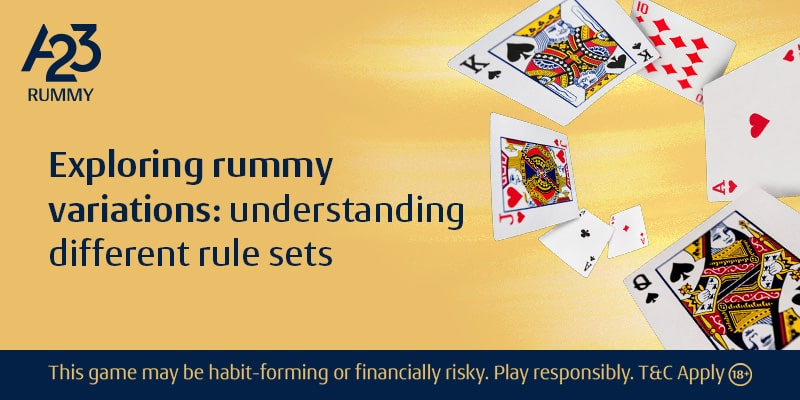
Rummy is a classic game that is played by millions of people all over the world, offline and online. Since it is an old card game, there are numerous Rummy variations.
It is said that there are around 60 Rummy variations known to the modern world.
It is a game that travelled from China and Spain to around the world and changed over time. This phenomenon exhibits the global appeal rummy has and its fascinating ability to adapt to the environment it travels to.
In this blog, we will discuss different Rummy variations and Rummy rules according to the change in variations!
Rummy Variations
While Rummy rules might be distinctive and slightly different from one another, the objective of all the Rummy variations remains the same: creating valid sets and sequences to negate the card values.
Once you understand this one basic objective, you can shape your gameplay likewise.
1. Classic 13 Card Rummy
The traditionally played Rummy, also known as the 13-card classic Rummy, is one of the most popular Rummy variations played out there.
- A standard 52-card deck is used.
- The objective of a classic 13-card Rummy is to form valid sets and sequences by melding cards.
- It required a valid declaration that typically consists of sequences and sets.
- In order to create these combinations, players have to draw and discard their cards.
2. Indian Rummy
Indian Rummy rules and classic 13-card Rummy rules and objectives are very similar to each other.
- Indian Rummy introduces a wild card, the Joker, to the deck.
- What a Joker does is fill in the place of any other card that is required to complete the set or sequence.
- If a valid set or sequence is created with the help of the Joker, that set or sequence is called an impure meld.
- If the meld is created without the Joker card, it is pure.
- According to Indian rummy rules, In order to win Indian Rummy, players need at least one pure sequence to declare their hand.
3. Points Rummy
With points, the game gets a little tense. This is mainly because it is a time-sensitive Rummy variation. Points Rummy rules are similar to classic rummy as well.
- Creating valid sets and sequences.
- Discarding and drawing cards at every round.
- The players compete to accumulate points based on the value of the cards melded by the winner.
- It is also played with the penalties incurred by the losing players.
- The player with the lowest score at the end of the game will win Points Rummy.
4. Deals Rummy
Deals Rummy is a series of deals or rounds of Rummy. This rummy variation is played for a fixed number of deals or rounds, where each deal has its own winning and losing party.
- All the players will have to compete with each other to win each deal.
- The player with the most wins at the end of the deals will be considered the winner.
- All the other rules are similar to the Classic Rummy rules.
5. Pool Rummy
As the name suggests, Pool Rummy is a Rummy variation where players compete to avoid reaching a predetermined pool limit, i.e., the designated threshold of points.
- Players accumulate points based on the value of the cards that are not melded in their hand.
- The basic objective is to create valid melds of cards in hand and the ones that are drawn.
- One of the primary rummy rules is to stay below the pool limit.
- The player who exceeds the pool limit is eliminated from the game, and the remaining players will continue to play the game.
Conclusion
Versatility is the beauty and point of attraction of this world-class game, Rummy! Players can choose among the different Rummy variations and master their preferred gameplay and playstyle. We hope you found this guide about Rummy variations and rules useful. All the best for your Rummy adventure and we hope you find the best-suited Rummy variation on A23 for yourself!




 May 17, 2024
May 17, 2024
Note: that your message will not be displayed until it is reviewed by the moderator!